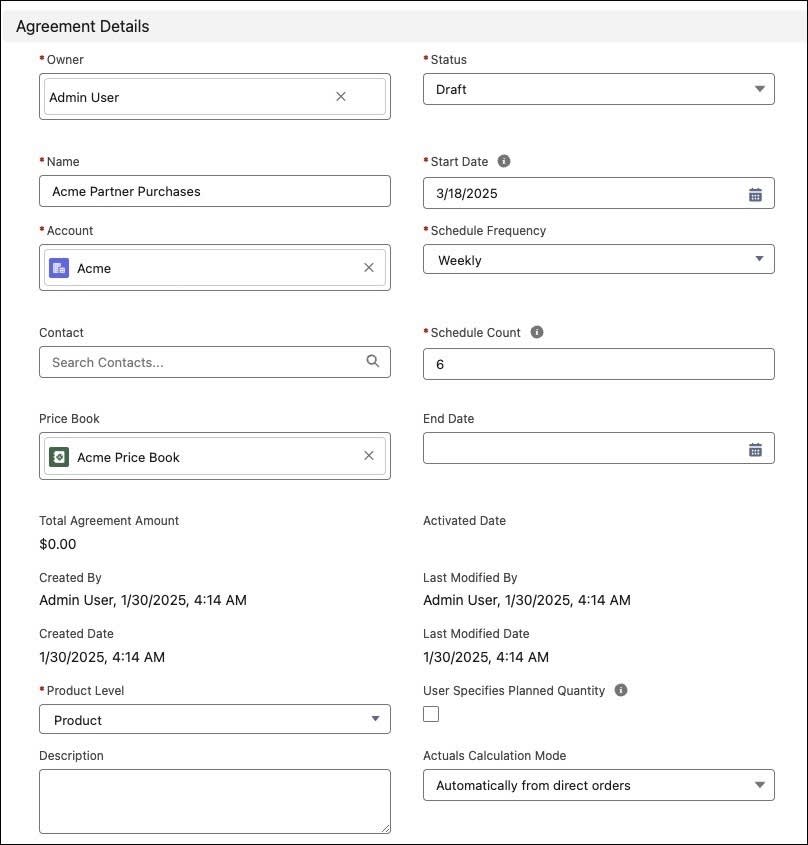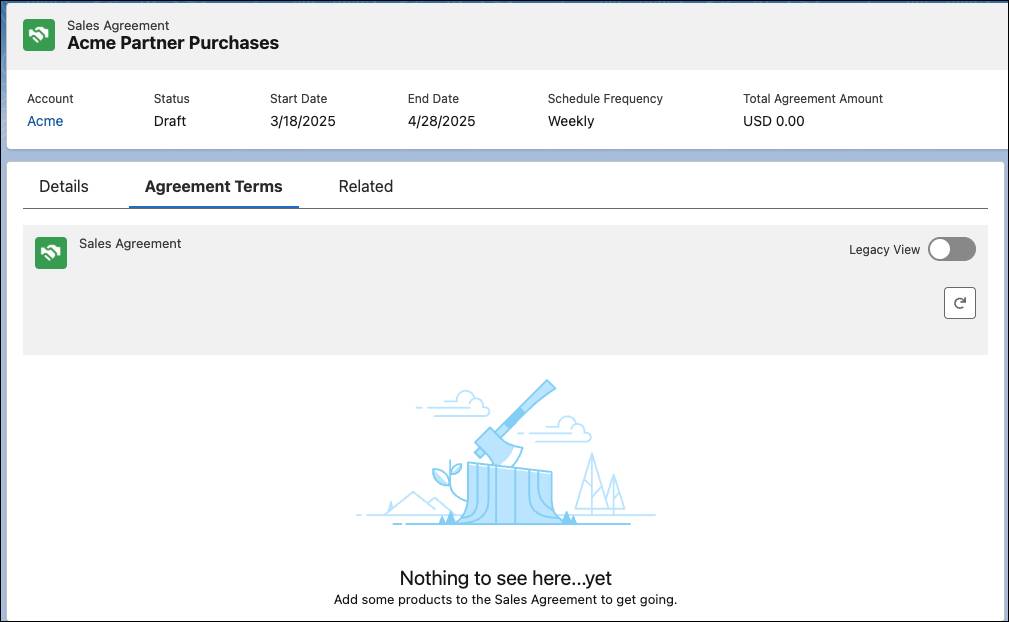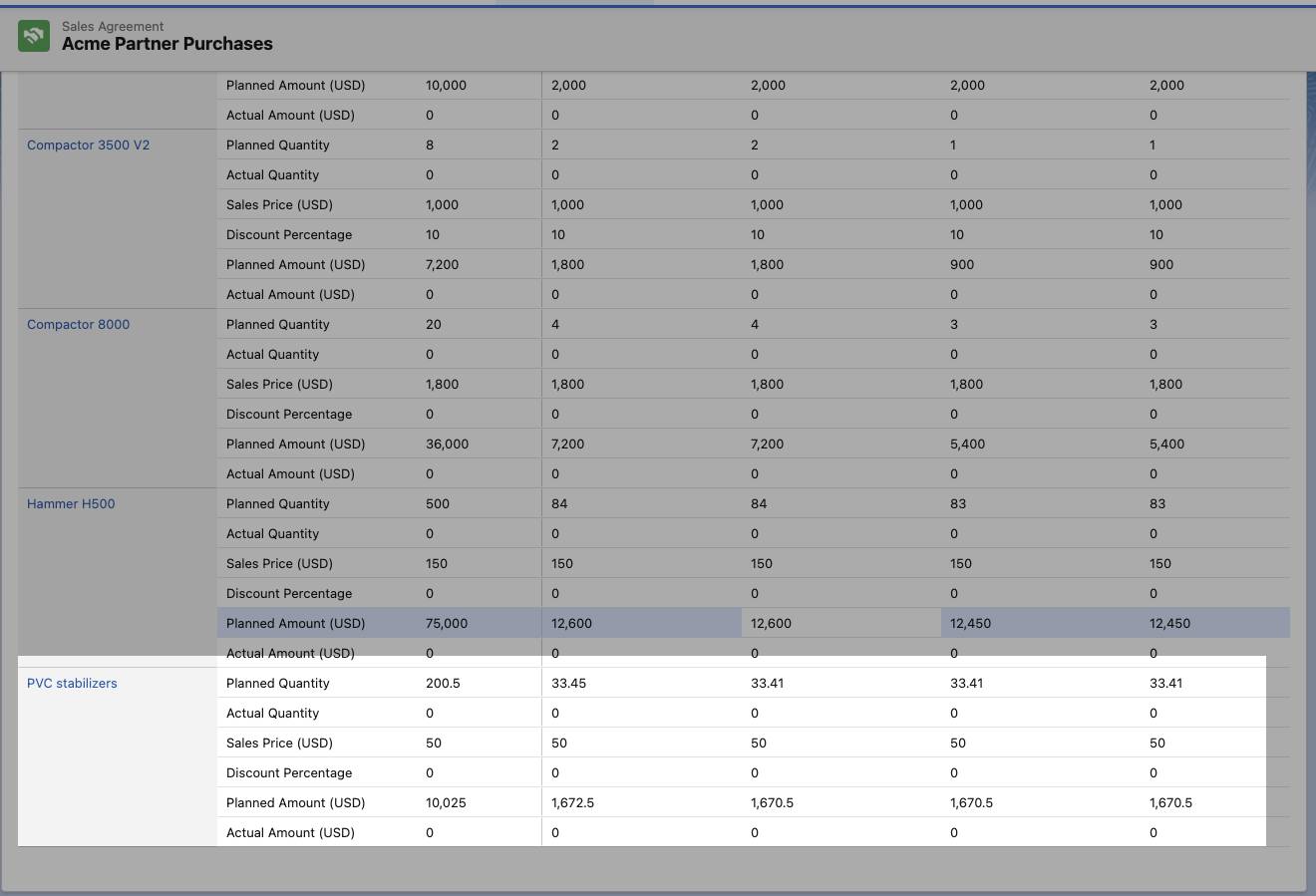Create and Approve a Sales Agreement
Learning Objectives
After completing this unit, you’ll be able to:
- List the key stages in the lifecycle of a sales agreement.
- Create a sales agreement.
- Add products and approve a sales agreement.
Lifecycle of a Sales Agreement
Sales agreements usually move through a cycle from creation to renewal. It typically begins with drafting and ends with the sales agreement taking effect.
The table defines each stage of the lifecycle.
Stage |
Description |
|---|---|
Draft |
Status in which you create a sales agreement. You can add and delete products at this stage. |
Approved |
After the terms of a sales agreement are finalized, the status is updated to Approved. |
Activated |
After approval, a sales agreement is automatically activated on its start date. |
UnderRevision |
When you update the agreement terms or add products while the agreement is in the Draft or Activated status, the status automatically changes to UnderRevision. |
Expired |
Status when an activated sales agreement automatically expires on its end date. |
Cancelled |
If a sales agreement is in Cancelled status, it can’t be edited. |
Renewed |
Status when an existing sales agreement is renewed during its renewal period. |
At Pyroclastic Inc., Vance creates a new sales agreement for Acme, which is in Draft state. Once activated, it allows Acme to place product orders over a defined period.
Negotiate Terms with Sales Agreements
Before creating a sales agreement, account managers usually work with dealers or distributors to agree on key terms like pricing and quantities. These talks often lead to a new sales agreement, or sometimes, changes to an existing one. This depends on what changes are allowed and the permissions in place.
After a tense meeting with a distributor for Acme, Vance has several key takeaways. His insights help him prepare and refine the terms of the agreement.
-
New sales agreement: Pyroclastic Inc. has recently launched a new product, and it’s generating a lot of buzz in the market. Acme is keen to source this new product from Pyroclastic Inc. because customers are asking for the latest technology and expect Acme to keep up with market trends.
-
Change in pricing: Acme asks Vance to look into the pricing of two additional products in the new sales agreement.
If the price is right, Acme plans to buy these products in bulk for the next six months and would appreciate a discount. No pressure here for Vance!
-
Urgent order placement: Acme doesn’t want to waste time, and asks Pyroclastic Inc. to ship the first order immediately. This means Vance must activate the agreement and create orders in advance to keep the pace.
These kinds of negotiations are common across industries. With sales agreements, account managers can structure terms efficiently and move from discussion to action with speed, transparency, and alignment between seller and buyer.
Create a Sales Agreement
Once you have all the details, you’re ready to create a sales agreement.
- Select the customer that the agreement applies to.
- Choose the appropriate price book to reflect the agreed pricing.
- Set the agreement term, including start and end dates.
- Set the frequency and count of the schedule.
- Optionally, override the default mode of calculating actuals.
- Save the agreement to move to the next steps of adding products.
Follow Vance as he sets up a sales agreement with Acme, based on their latest negotiations. Here’s an image of the Agreement Details screen.

Vance sets up the Acme purchases agreement, he associates it with the Acme account. For pricing definitions, he uses the Acme price book. Once saved, the new sales agreement opens on his screen showing the Agreement Terms tab with the default values that he specified earlier:
- The Future Actual Calculation Schedules as 6 weeks.
- The renewal period as one month before the agreement expiration date.

Vance has now created a sales agreement with a 6-week term and is ready to add products.
Add Products to the Agreement
As you add products to a sales agreement, the list prices populate both the List Price and Sales Price fields by default from the associated price book. The ability to add the same product multiple times to a sales agreement is a time-saving option.
Every time you add a duplicate product, make sure that the display name is unique. However, that’s not all. You have to choose one of the duplicate products as the Actuals Calculation Product before you can activate the sales agreement.
In the Sales Price column, Vance adjusts the pricing by updating it to the new sales price per unit. He provides discounts based on earlier negotiations for the addition of two more products. He can add different configurations of the same product to a single sales agreement instead of having to create separate ones for each configuration.

Because Vance selected the Quantity in Decimals checkbox for the PVC Stabilizers, he can also update the quantities in decimal.

Here is how the Agreement Terms tab looks, with decimal values for the planned quantity and amount.

On the Agreement Terms tab, Vance scrolls right and sees that the initial total quantity for each product has been distributed across the six weeks. He can also see the sales prices and discounts for each product. He now has all the information he needs to have productive discussions with the team at Acme.
Approve a Sales Agreement
Before agreements go live, they typically go through an approval process. Your organization may use predefined approvals or flexible approvals.
-
Predefined approval processes: Only certain users can approve sales agreements.
-
Flexible approval: Users can either follow a process or self-approve.
Choose the appropriate approval path based on your organization’s business requirements. Once approved, the agreement moves into the Activated state on its scheduled start date.
For example, at Pyroclastic Inc., Vance self-approves the Acme agreement because the company allows flexible approvals.
The Next Steps
Once activated, Acme places its first order. Vance can now track their order quantities and revenue metrics. In the next unit, learn how creating and implementing this sales agreement creates a success story for Pyroclastic Inc.